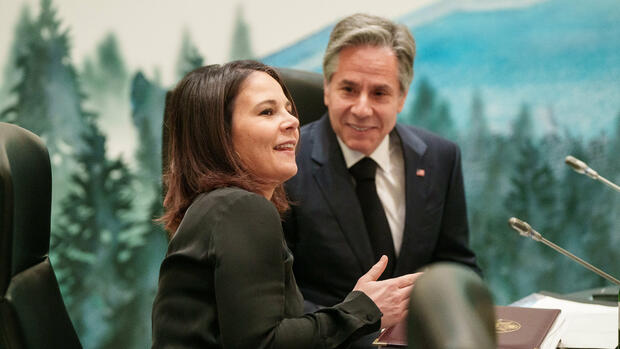Karuizawa Germany and its international partners want to reduce economic dependency on China. For the first time, the G7 foreign ministers included a chapter on economic security in the joint declaration at the end of their meeting on Tuesday in the Japanese holiday resort of Karuizawa.
It said: “We express our concern that threats to economic security are increasing and emphasize the urgent need to improve our coordination and cooperation within the G7 and beyond.”
The G7 countries, which, apart from Germany, include the USA, Great Britain, Canada, France, Italy and Japan, shared the view that resilient supply chains should be built in a transparent, diversified, secure, sustainable, trustworthy and reliable manner.
Although China is not explicitly mentioned at the point in the document, it is clear that this passage is primarily aimed at dependence on the People’s Republic.
The Chinese government is becoming more and more repressive towards its own people. At the same time, it is becoming increasingly aggressive on the international stage, for example in relation to Taiwan. In the past, China has exploited economic dependencies to achieve political goals.
From left: James Cleverly (Great Britain), Annalena Baerbock (Germany), Antony Blinken (USA), Yoshimasa Hayashi (Japan), Melanie Joly (Canada), Catherine Colonna (France), Antonio Tajani (Italy) and Enrique Mora Benavente (front in the middle).
(Photo: IMAGO/photothek)
There are numerous dependencies worldwide on the second largest economy in the world. A large part of the production of so-called rare earths comes from China.
Japan calls for a “resilient supply chain” – also from personal experience
The passage in the final document was primarily a wish of the Japanese government. However, according to people familiar with the talks, there was general agreement that the chapter should be included.
Japan holds the G7 presidency this year. The country felt more than a decade ago what it means when China uses economic dependencies to punish other countries.
In 2010, Beijing blocked the export of rare earths from China to Japan. The reason at the time was the collision between a Chinese ship and patrol boats from the Japanese Coast Guard near one of the archipelagos claimed by both countries.
>> Read here: Why Japan is a role model for Scholz when it comes to the security of raw materials
“We should build a resilient supply chain based on reliability,” Japanese Foreign Minister Yoshimasa Hayashi said in Karuizawa. Japan itself has been trying to become more independent from China for years, and has even set up a ministry for “economic security” to do so.
Yoshimasa Hayashi, Japan’s foreign minister, has advocated a clear line towards China.
(Photo: AP)
Overall, according to information from several people informed about the content of the talks, there was great agreement among the G7 countries with regard to China. Included in the statement for the first time is the demand on China for fair conditions for foreign companies.
“Legitimate operations and interests of foreign companies must be protected from unfair, anti-competitive and anti-market practices, including unlawful transfers of technology or data in exchange for market access,” the document said.
At the same time, however, the G7 foreign ministers also emphasized that they want to continue working with China. “We recognize the need to work with China on global challenges and areas of common interest, including climate change, biodiversity, global health security and gender equality,” reads this part of the final statement.
Taiwan conflict plays big role
With regard to the Taiwan conflict, the clear formulation that the seven states had already chosen in their last declaration under the German presidency last year remained essentially the same. China is called for a “peaceful solution” to the Taiwan issue.
However, the G7 also stressed that they remain committed to their version of a “one China policy”. To put it simply, this means that the countries only maintain official diplomatic relations with Beijing, but not with Taipei.
China claims Taiwan as part of its territory, even though the country has never been part of the People’s Republic established in 1949, has its own democratically elected government, and polls have consistently seen Taiwanese citizens not want full integration with China. Beijing has not ruled out that it will one day take the island by force and regularly conducts military maneuvers in the area.
>> Read here: Lula receives Lavrov – and snubs the US and Europe
What is new in the G7 document is that the states are calling for Taiwan to participate in international organizations such as the World Health Organization (WHO). This point is likely to be a red rag for the Chinese government: Anything that brings Taiwan closer to state recognition in any way could be viewed in Beijing as a departure from the status quo.
G7 wants to help the Global South
The G7 countries sent a message of support to the so-called Global South, which essentially consists of developing and emerging countries. The G7 takes China’s growing influence over these countries seriously. US Secretary of State Antony Blinken said on Tuesday that “probably two-thirds of the discussions” at the G7 foreign ministers’ meeting revolved around development issues.
The foreign ministers discussed a wide range of action plans, including food security, energy supply, help to deal with climate change and “building infrastructure that meets the needs of countries around the world”.
In addition to China, Ukraine was also high on the agenda. G7 foreign ministers renewed their support for the country under Russian attack. “Today we have again committed ourselves to supporting Ukraine for as long as necessary and to providing sustained security, economic and institutional support,” the joint closing statement reads. They want to help Ukraine to defend itself, secure its free and democratic future and “fend off future Russian aggression”.
More: Baerbock on a trip to Asia – China is always the topic
